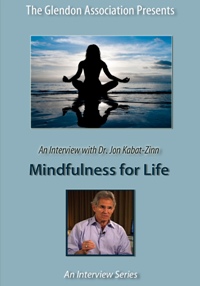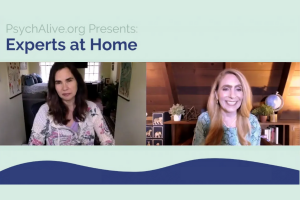Mindfulness – Full Catastrophe Living
Watch and read our exclusive interview with Jon Kabat-Zinn.
Another way to speak of it is ‘heartfullness.” – In all Asian languages the word for “mind” and the word for “heart” are the same words. So if you’re hearing mindfulness as some kind of clinical, thought-based thing, you’re way off base. This has to do with a kind of feeling sense, in a way of feeling ourselves into our experience from moment to moment to moment. Good, bad or ugly, I might say. What Zorba the Greek called “the full catastrophe.” And I called my first book Full Catastrophe Living. I tried not to use that title. I got – I went through 2,000 other alternatives, but “Full Catastrophe” kept coming back, coming back, coming back because it’s the nature of the human condition to actually, at times, encounter uncertainty, stress, pain, loss, grief, sadness and also a tremendous potential for joy, connection, love, affiliation. And all of that is ‘the full catastrophe.’ It’s not just the bad stuff. It’s everything. And the question is, “Can we love it, can we live inside of it in ways that actually enliven us and allow us to be fully human?” I would say.
So that’s why it’s valuable to cultivate mindfulness. It also doesn’t really take any time because even if you think about it for a moment, the present moment’s all we’ve got. It’s always now. Oh my goodness. Every time you check, it’s now again. Except that we’re always someplace else. So the process is one of re-connecting with how it is now and it doesn’t actually matter how it is now. This is radical stuff and when we do it, it’s actually something akin to a, a radical act of love. Just to stop in your life. Just to drop in on the moment and be aware of what is going on. And really, the way, uh, you can think of mindfulness is, it is the awareness that arises when we pay attention on purpose in the present moment, non-judgmentally, as if our life depended on it. And we don’t need to effort this very much. This is something that could be done gracefully. In fact, I would say it’s not even a doing. What it is, is a falling back into or a re-claiming of our own being.
Order the Full DVD Interview:
 Mindfulness for Life: An Interview with Jon Kabat-Zinn
Mindfulness for Life: An Interview with Jon Kabat-Zinn
In this DVD, Dr. Jon Kabat-Zinn defines mindfulness as a way of “connecting to your life.” He discusses the “hard work” of living in the present moment, the personal and psychological impacts of developing a practice of mindfulness, and the benefits of utilizing mindfulness in therapy. He also touches upon mindfulness in parenting. Drawing upon his years of experience and research in the field of mindfulness, Dr. Kabat-Zinn offers an inspiring and instructive approach for mental health professionals and curious individuals alike.
Tags: affiliation, connection, cultivating mindfulness, grief, jon kabat-zinn, joy, loss, love, mindful living, mindfulness, pain, sadness, stress, uncertainty









Leave a Reply